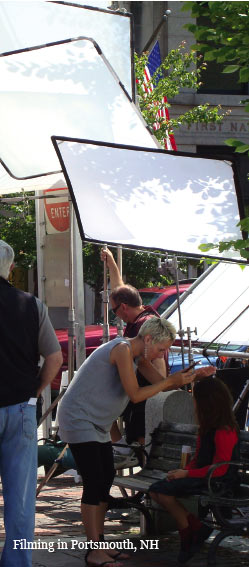By Carol Patton
Late last year I hosted a panel at the Media Resource Expo in Danvers, Massachusetts at the annual Media Resource Expo with extraordinary panelists Representative Ann- Margaret Ferrante, Berkshire Film and Media Collaborative Executive Director Diane Pearlman and Filmmakers Collaborative Executive Director Laura Azevedo.
Our topic was The Importance of Film Tax Credits and How to Defend Them in 2017. The major take-away from this panel discussion was suggested by Representative Ann- Margaret Ferrante and that is to not wait until the legislative season began to remind our elected legislators and the Governor’s Of ce how important MA Film Tax Credits are to each and every one of us. And to tell our own individual stories.
In December IMAGINE called for a letter writing campaign to begin early in the year doing just that before the Governor gave his State of the Commonwealth Address and before he prepared his budget.
After two years of literally everyone in the industry responding to the Governor’s rst try at eliminating our credits altogether in favor of earned income tax credits for the working poor, and then his second year in of ce trying to limit our credits severely by capping them, no one was quite sure of what to expect this third year. Would he be thinking “third time is a charm” or perhaps realize the merit and strength of the production community. Letters were sent.
Meanwhile, there has been no mention of MA Film Tax Credits in the Governor’s State of the Commonwealth address, nor are our Film Tax Credits mentioned in the Governor’s proposed budget.

In our industry’s favor on February 16, 2017 the Massachusetts Production Coalition (MPC) sponsored “Film Set Day” in the Great Hall of the MA State House for the express purpose of recreating the execution of a major motion picture production from pre-production, scouting locations, set construction, set decoration, art and costume departments, casting, stunts, shooting, crew, catering, stages and staging, all the way to post-production and special effects. This process effectively demonstrated to legislators and their staff the entire process and showed how many ancillary businesses and tradesmen are actually essential to the business. Yes, everything from lumber and paint companies to talent trailers, mobile restrooms and waste management.
Many new jobs and businesses have incubated in Massachusetts since we passed lm tax credits in 2005; there were no catering companies in the state that catered to motion picture sets. Productions brought their caterers in from LA and New York – these huge trailers that could house their operations and feed the crews two meals a day. This practice greatly increased production costs. That production need alone created both challenge and opportunity for local caterers to create on set catering businesses for themselves.
On Film Set Day, Dolce Catering fed the legislators and their staffs as if they were on the set of a major motion picture. Later I spoke to Jessica Halloran of Dolce Catering. She was there, ‘It was a great event and awesome turnout supporting the industry,” she enthusiastically said.
“The Film Tax Credits are vital to sustain and grow the production industry in Massachusetts. It’s reassuring to meet legislators that support them and comprehend the development process necessary to establish a new industry in the Commonwealth. It’s important to businesses like Dolce Catering to know that there are people on our side interested in establishing the production industry as a permanent xture and source of revenue like it is in New York City. As you’ve seen here today, we have the resources to make that happen.”

combines her vast knowledge of the Cape and
her love of film to create MakeAMovieHere.com, a concierge services company for studios, major producers and independent filmmakers. Photo courtesy of Terie Michon.
Terie Michon, who is a longtime resident and realtor on Cape Cod, is transferring her knowledge and expertise into a “concierge” service for the beautiful area she lives in, which she happens to know like that back of her hand. Her “MakeAMovieHere.com” offers studios, major producers and independent filmmakers Transportation-Air, Land or Sea; Location Scouting, Location Negotiation and Acquisition; Permitting; Accommodations for cast and crew, as well as catering, marine services for large and small vessels (including Captains and Crew), Cleaning/Housekeeping, Nannies and Child Care, Lawn/Landscaping, Hauling, Masonry, Painting, Carpentry – if you need it on The Cape, Terie will arrange it for you.
There are big time beneficiaries of production industry, too, like the transportation and accommodations sector. The state of Massachusetts prospers when studio Films are on location in the area, and the benefits touch a wide range of businesses and organizations. Within this is the luxury hospitality industry, showing a significant growth in the entertainment segment following the initiation of the film tax incentive in the state. Four Seasons Boston, the premiere luxury hotel in the city, spoke with IMAGINE about the beneficial impact the tax incentive has had on their business specifically.


Director of Sales at Four Seasons Boston, Jason Bossenberry, shared that the entertainment segment of business received at his Hotel has increased by more than 90% over the past several years. Though this is not all related to lm (music and sports also fall within this sector), a signi cant portion of the increase can be assigned to feature film production.
Four Seasons maintains a strict code of confidentiality for their guests, creating a particularly attractive environment for high pro le individuals in the industry. “As a luxury hotel, we often have an opportunity to host the Talent, Directors, and Producers for long term stays,” says Bossenberry. “We operate with the highest levels of discretion, which is attractive for these individuals while they’re in town. We also have seventy-seven Suites, significantly more than most properties, allowing us to guarantee a larger, luxury environment and make guests feel like they have a true home away from home during their time in Boston.”
Even Entertainment Attorneys get more work. Elaine Rogers, Entertainment Attorney at Meister, Seelig & Fein LLP says, “I represent Jeff Bauman (Boston Marathon survivor and double amputee) with regards to his book “Stronger” and option/purchase of the book rights for the upcoming Lionsgate movie STRONGER starring Jake Gyllenhaal which was lmed in the Commonwealth. I have found that this lm and other productions coming to the Commonwealth have provided additional opportunities for local talent. From my perspective, the attractive tax incentives have certainly contributed to the increase in entertainment business here in the Commonwealth.
Noah Lydiard, Conductor Productions co- owner and executive producer adds, “We are seeing more commercial and lm work come in from out of state since the addition of the tax credit. We’re pulling in jobs from California and New York. At least part of the reason they are here is our ability to keep our prices competitive by utilizing the tax credit. These are jobs that might not be here otherwise.”
Perhaps the Governor has noted that in ten years Massachusetts has hosted 170 Major Productions, which have been shot in 190 cities and towns spending more than $2 billion in our state while creating 14,500 new jobs with an average salary of $67,000.
Perhaps someone told him that in 2016 background artists, known as Extras, worked over 11,000 days on Massachusetts based productions averaging $320 a day and that Day Players, actors with speaking lines, had their best year ever. Over 400 were hired at $1000 per day. And there will be residuals paid in perpetuity – paying taxes to the Commonwealth in perpetuity.
Representative Ann-Margaret Ferrante offered this comment to IMAGINE, “I am encouraged that Governor Baker has relented in his efforts to eliminate the Massachusetts Film Tax Credit. Numerous initiatives and brie ngs have done an effective job explaining the bene ts of the Film Tax Credit, such as job creation and support for so many small businesses,”
Our economic engine is roaring.












